Table of Contents
ToggleIntroduction
Quantum computing is no longer the stuff of science fiction; it’s here and poised to reshape industries in a big way. By 2023, the quantum computing market had reached an impressive value of $885.4 million. Experts predict this number will soar to $12.6 billion by 2032, with a remarkable growth rate of 34.8% CAGR. In fact, a survey from IBM showed that over 91% of businesses anticipate quantum computing will drastically alter their sectors in the coming decade. This isn’t just a futuristic concept; it’s a tech revolution that’s happening now across various industries, from finance to healthcare.
So, What Exactly is Quantum Computing?
In simple terms, quantum computing is like regular computing but with a rocket engine attached. Traditional computers process information in bits (either 0s or 1s), but quantum computers operate with qubits (quantum bits), which can exist as 0, 1, or both simultaneously. This superposition—thanks to quantum mechanics—opens the door to solving incredibly complex problems at speeds unimaginable with classical computers.

Don't miss out on your chance to work with the best
apply for top global job opportunities today!
What’s a Qubit?
A qubit is the smallest unit of quantum information. While classical bits are binary (either 0 or 1), qubits can be 0, 1, or both simultaneously. Picture solving a puzzle: a classical computer checks one piece at a time, but a quantum computer examines every possible arrangement simultaneously. This leap in processing power is a game changer for industries requiring immense computational capabilities.
The Magic of Superposition
Superposition allows qubits to exist in multiple states at once. Imagine navigating a maze: a classical computer follows one path at a time, but a quantum computer can explore all routes at once, arriving at the exit much faster. For instance, cracking a password that might take a classical computer ages could be done in seconds with a quantum computer, making superposition a critical aspect of its speed.
The Spooky Concept of Entanglement
Entanglement takes things up a notch. When two qubits are entangled, the state of one affects the other, even if they’re light-years apart. Imagine rolling two dice—one in New York and the other in Tokyo—and both land on the same number, instantly. Even Einstein found this bizarre, dubbing it “spooky action at a distance.” Entanglement is one of the core principles that gives quantum computers their incredible power.
Why Do Classical Computers Fall Short?
Classical computers excel at tasks like browsing the web or playing videos but struggle with highly complex calculations, such as simulating molecular structures or optimizing supply chains. They process data one step at a time, which limits their efficiency. Quantum computers, however, use superposition, entanglement, and quantum tunneling to break through these limitations, solving problems previously deemed impossible for classical systems.
Classical vs. Quantum Computers: A Quick Comparison

| Feature | Classical Computers | Quantum Computers |
|---|---|---|
| Processing Power | Limited by binary bits | Qubits allow simultaneous processing |
| Data Security | Traditional encryption | Unhackable quantum encryption |
| Key Principles | Boolean logic, binary computation | Superposition, entanglement, tunneling |
| Error Rates | Low, stable operations | High error rates, qubits are fragile |
| Cost | Affordable, accessible | Expensive and experimental |
| Speed | Solves problems sequentially | Solves problems simultaneously |
| Scalability | Highly scalable | Hard to scale with current tech |
| Applications | Well-established across industries | Limited, still early-stage |
| Size and Power | Compact, energy-efficient | Requires large power and cooling systems |
Principles Behind Quantum Computing

Quantum computing is powered by a set of unique principles that distinguish it from classical computing:
- Superposition: The ability to exist in multiple states allows quantum computers to tackle many calculations at once.
- Entanglement: Entangled qubits work together instantly, making quantum systems much more efficient at transferring and processing information.
- Quantum Interference: This phenomenon manipulates the probability of qubits being in certain states, amplifying correct solutions while reducing incorrect ones.
- Quantum Tunneling: Particles can “tunnel” through barriers, making it possible to solve problems with obstacles that would stump classical computers.
Real-World Example: Pizza Delivery with Quantum Speed!
Picture running a pizza delivery service in a crowded city. You need to find the fastest route to deliver multiple orders. A classical computer would calculate each possible route one by one, taking ages as more stops are added. A quantum computer, however, could assess all possible routes simultaneously, instantly finding the fastest one. This would result in quicker deliveries, happier customers, and reduced costs for your delivery drivers. Quantum computing dramatically boosts efficiency in such optimization problems.
The Bright Side of Quantum Computing
- Faster Processing: Quantum systems solve complex problems in a fraction of the time.
- Ultra-Secure Encryption: Quantum encryption methods are nearly impossible to crack.
- Medical Advances: Modeling molecular structures with quantum computers could speed up drug discovery.
- Financial Optimization: Quantum algorithms streamline risk management and portfolio optimization.
- Environmental Impact: Quantum simulations could help predict climate changes and develop solutions to combat them.
Challenges and Limitations in Quantum Computing
While quantum computing is revolutionary, it’s still in its early days. Here are some hurdles:
- Fragile Qubits: Qubits are easily disturbed by external factors like temperature.
- Error Rates: High error rates make quantum systems less reliable without advanced error correction techniques.
- Scalability: Building large-scale quantum computers is still a technical challenge.
- Cost: Quantum computers are expensive to build and maintain.
- Specialized Skills: A deep understanding of quantum mechanics is required, and skilled professionals are rare.
Companies Leading the Charge

- IBM: Offers cloud access to quantum systems, allowing businesses to experiment with quantum computing.
- Google: Claimed quantum supremacy in 2019 with a quantum processor that solved a problem classical computers couldn’t.
- Microsoft: Azure Quantum integrates quantum hardware from various providers into a cloud-based platform.
- Rigetti: A startup developing quantum processors and offering them as a cloud service.
- Honeywell: Another major player making significant strides in quantum computing development.
Also Read: Top Game Development Courses in 2024 Conclusion
The Quantum Leap Awaits Quantum computing isn’t just the next step in technology—it’s a monumental leap that could redefine how we solve problems. From reducing the time to cure diseases to unlocking the secrets of the universe, quantum computers hold the potential to transform industries on a scale we can barely imagine.
With giants like Google, IBM, and Microsoft pushing the envelope, it’s not a matter of if but when we’ll see quantum computing integrated into our everyday lives.
Yet, challenges remain—building stable qubits, developing efficient quantum algorithms, and scaling quantum hardware are still hurdles that scientists need to overcome. But as these issues are addressed, quantum computing will become more accessible, opening up transformative possibilities for industries worldwide.
So, whether you’re a tech enthusiast or someone just looking forward to faster pizza deliveries, keep an eye on quantum computing—because it’s the future, and it’s arriving at quantum speed!
Take control of your career and land your dream job
sign up with us now and start applying for the best opportunities!

FAQs
We’re still in the early stages of quantum computing. While companies like Google and IBM have made significant progress, fully functional, large-scale quantum computers that can tackle practical problems are likely still several years away. However, rapid advancements are being made each year!

